|
|
|
Sort Order |
|
|
|
Items / Page
|
|
|
|
|
|
|
| Srl | Item |
| 1 |
ID:
185096
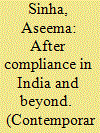

|
|
|
|
|
| Summary/Abstract |
Using India as a theory building case, this paper puts forward a theoretical framework for understanding countries’ responses to global rules and implementation effects across diverse global governance regimes and contexts. The initial premise for this paper is that the strategic structure of implementation dilemmas faced by states and actors within countries need to be understood in addition to design dilemmas. Successful global regimes must not only solve cooperation and uncertainty problems at the initial stages in choosing the right institutional matrix, but also ‘require changes in domestic institutions.’ The need to change domestic institutions creates certain implementation dilemmas. These dilemmas are a joint product of the institutional design, specific policy issue and the domestic logic of responses after international agreements have been signed. This broader idea helps understand a wide variety of India’s interactions across global governance institutions. I also suggest a novel empirical strategy of cross-institutional analysis to assess implementation dilemmas. While we have numerous cross-national studies of how compliance occurs in a wide variety of countries, we lack theory-driven, empirically grounded, comparative studies of a single country or a group of countries across diverse global regimes. Such a framework can help us better understand how countries interact with a variety of global institutions and the reciprocal effects. This framework is then used to understand India’s interactions with diverse global regimes in an illustrative manner in this article, and in greater detail by other authors in the section published in this issue of Contemporary South Asia.
|
|
|
|
|
|
|
|
|
|
|
|
|
|
|
|
| 2 |
ID:
154835
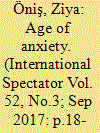

|
|
|
|
|
| Summary/Abstract |
The crisis of liberal democracy is closely associated with major global shifts, which have been accelerated by the global financial crisis of 2008, with its dislocating effects in the established democracies of the global centre. Relative stagnation and rising problems of inequality and unemployment, coupled with additional shocks in the form of mass migration and terrorist attacks have generated fertile grounds for the rise of right-wing radical populist sentiments, which have been turned into electoral advantage by charismatic leaders. The crisis of liberal democracy is also a global phenomenon in the sense that liberal democracy has been severely challenged by the rise of strategic models of capitalism, notably its authoritarian version represented by the growing power and influence of the China-Russia coalition. Indeed, the success of the latter has served as a kind of reference for many authoritarian or hybrid regimes in a changing global context, at a time when the key Western powers appear to be losing their previous economic and moral appeal.
|
|
|
|
|
|
|
|
|
|
|
|
|
|
|
|
| 3 |
ID:
142208
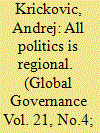

|
|
|
|
|
| Summary/Abstract |
Tip O'Neill famously claimed, “All politics is local.” As global governance falters and US leadership wanes, will “all politics” become regional with emerging powers (China, Russia, Brazil) taking responsibility for leadership at the regional level? While regional powers are providing effective leadership on free trade and financial stability, they have made much less progress on security issues where their approaches to certain problems, such as human security, diverge from those adopted by the West. Their ability to provide regional leadership is hampered by the increasing complexities of the modern world, including the conflicting dynamics of regionalism itself. The emergence of a centralized system of regional governance based on the hegemony of regional leaders is therefore unlikely. Instead, we are seeing the emergence of a complex and dynamic system of governance that includes a broad range of actors operating on multiple and overlapping levels.
|
|
|
|
|
|
|
|
|
|
|
|
|
|
|
|
| 4 |
ID:
122832
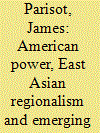

|
|
|
|
|
| Publication |
2013.
|
| Summary/Abstract |
Recent years have seen a revival of discussions on American decline. This paper intervenes in this debate by suggesting that there is a tendency towards partial conceptualisations of US power. It suggests a new historical materialist perspective that makes it possible to theorise American Empire as a relational social totality embedded within global capitalism. The paper then analyses the social limits of China's rise and the integration of East Asian regionalisation into American Empire, suggesting the extent to which world power has shifted east has tended to be overestimated. It also analyses the emergence of Brazil, India, and the brics meetings, suggesting these developments have a limited, but overstated, capacity to challenge American Empire.
|
|
|
|
|
|
|
|
|
|
|
|
|
|
|
|
| 5 |
ID:
117537
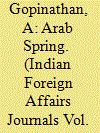

|
|
|
| 6 |
ID:
131988
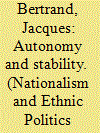

|
|
|
|
|
| Publication |
2014.
|
| Summary/Abstract |
Autonomy is often seen as an institutional instrument to manage substate nationalist conflict. Its implementation is key in determining its impact on conflict. While the central state might be satisfied with the absence of violence and stability as a measure of success, an aggrieved group will view success as gaining new powers and new resources. Autonomy often unravels when different goals are being pursued during implementation. "Special autonomy" in Papua failed because, first, the law was not the product of negotiation but of a solution that the central government imposed; second, Papuans remained divided on its utility and, ultimately, failed to seize the opportunity provided; third, the central government undermined the law in its attempts to curb secessionism, ultimately failing to make it credible.
|
|
|
|
|
|
|
|
|
|
|
|
|
|
|
|
| 7 |
ID:
144465
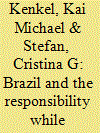

|
|
|
|
|
| Summary/Abstract |
This article examines Brazil's responsibility while protecting (RwP) initiative as an example of norm sponsorship available to nonpermanent members of the Security Council. After setting the stage with Brazil's historical engagement with intervention issues, it discusses the reasons behind the Brazilian initiative. It examines RwP's key proposals and the reactions they generated. RwP's normative implications are discussed, together with an examination of the main reasons why Brazil's sponsorship of the initiative waned following its exit from the Council. Brazil's withdrawal from sponsoring RwP highlights the need for ongoing support for initiatives that seek to revive the international community's intervention practices by tackling the basic tenets of discord over R2P's implementation.
|
|
|
|
|
|
|
|
|
|
|
|
|
|
|
|
| 8 |
ID:
172106


|
|
|
|
|
| Summary/Abstract |
Emerging powers from the global south have generally opposed the use of force in international politics. However, taking a closer look at the area of peacekeeping, the international community’s most institutionalized response to international insecurity, it is clear that the global south has been actively engaged in what has been described as peacekeeping’s coercive turn: the increasingly greater use of force. Building on the cases of Brazil and Indonesia, we argue that the peacekeeping policies of these emerging powers have been inconsistent with their declared reticence to use force. We explain the inconsistency by reference to knowledge imbalances between civilian and military actors, a gap in peacekeeping expertise and involvement in policy-making that allowed the armed forces to push the two countries into increasingly coercive peacekeeping. Moreover, civil–military knowledge imbalances prevented the emergence of alternative ideas more in line with Brazil’s and Indonesia’s traditional stance on the use of force.
|
|
|
|
|
|
|
|
|
|
|
|
|
|
|
|
| 9 |
ID:
121755
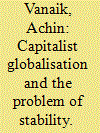

|
|
|
|
|
| Publication |
2013.
|
| Summary/Abstract |
Ever-expanding capital accumulation cannot be stable or cumulative without coordination and regulation provided by the state and the system of states, wherein the subset of the most powerful states is vital for establishing stability. There is a hegemonic transition of sorts towards a new quintet of powers in which the USA will remain indispensable as the key coordinator. Pretensions regarding China as the new hegemon are exposed as also are Indian claims. Moreover, it is argued that the brics grouping cannot provide an effective alternative to the quintet. However, the likely failure of the quintet to guarantee future stability raises the issue of the viability of capitalism itself. Transiting towards a post-capitalist order requires as a necessary if insufficient condition confronting the informal empire project of the USA that underpins capitalist globalisation.
|
|
|
|
|
|
|
|
|
|
|
|
|
|
|
|
| 10 |
ID:
136054
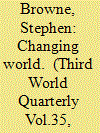

|
|
|
|
|
| Summary/Abstract |
This article examines five contemporary areas of development concern that have become major drivers of global transformation since the turn of the millennium: the plight of fragile states; the emergence of new powers and new development funds in a changing aid landscape; the need for developing countries to manage the growing resources at their disposal; encroachments on the political sovereignty of states; and new global challenges that demand global action, including climate change, migration, and food security. These drivers of change call for responses from the UN – and in particular its development system of some 30 organisations. The ongoing protracted debate on the future UN development agenda should take cognisance of these changes if the system is to remain relevant after 2015. But the signs are not promising that either the agenda or the UN development system are up to the task.
|
|
|
|
|
|
|
|
|
|
|
|
|
|
|
|
| 11 |
ID:
149308
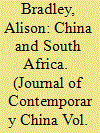

|
|
|
|
|
| Summary/Abstract |
In 18 years of China–South Africa relations, the two countries have evolved from minimal contact to deep economic engagement fraught with ideological and political uncertainty. The bilateral relationship is increasingly institutionalized on the global and regional level, yet also dogged by domestic criticism among a growing bloc of South Africans who are concerned by what they perceive as neo-colonial influence and an erosion of their democratic ideals. While South African President Jacob Zuma has publicly labeled the bilateral relationship ‘unsustainable’, a recent government document calls the Communist Party of China ‘a guiding lodestar of our own struggle’. This article asks whether South Africa’s leadership has the strength to stand up to an increasingly confident and assertive foreign power on its own soil.
|
|
|
|
|
|
|
|
|
|
|
|
|
|
|
|
| 12 |
ID:
177664
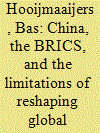

|
|
|
|
|
| Summary/Abstract |
Cooperation between Brazil, Russia, India, China and South Africa (BRICS) has increased since the first BRIC (Brazil, Russia, India and China) meeting in 2006. We have witnessed the establishment of various BRICS institutions, including the New Development Bank and the Contingent Reserve Arrangement. Because of its politico-economic weight, China exerts great weight on the BRICS exceeding that of its partners. Additionally, Beijing has pursued its own initiatives including the Belt and Road Initiative (BRI), and the Asian Infrastructure Investment Bank, with for instance the BRI having created frictions with other BRICS members including India. This article examines how and why China and the BRICS are reshaping global economic governance, and to what degree the BRICS and BRICS institutions represent anything new. More importantly, it analyzes China’s use of the BRICS to reshape global economic governance, and the potential for its independent initiatives to undermine the BRICS’ impact on global economic governance. It shows that the dynamics of the BRICS limit their potential of reshaping global economic governance. What is critical is the domestic political economy and interests of China, India and the other BRICS countries that all hold different positions and preferences in the international system.
|
|
|
|
|
|
|
|
|
|
|
|
|
|
|
|
| 13 |
ID:
167180
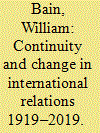

|
|
|
|
|
| Summary/Abstract |
This article reflects on themes of continuity and change over the past century of international relations. In 1919 the victors of the First World War endeavoured to remake international relations by abolishing war and erecting institutional structures that were intended to promote a more just world order. The achievements and failures of this project can be discerned in overlapping patterns of continuity and change that portray a world that is at once old and new. The discourse of change tends to dominate thinking about international relations. Technological innovation, globalisation, and human rights, among other factors, cultivate the progressive ‘one-worldism’ of an interconnected global community of nations and peoples. But, evidence of change notwithstanding, much of contemporary international relations would be intelligible to persons who lived a century ago. International relations is still fundamentally about order and security, power and restraint, and freedom and equality. These patterns provide an important reminder that progress is possible but that international relations involves an open-ended project of continuous renovation and conservation.
|
|
|
|
|
|
|
|
|
|
|
|
|
|
|
|
| 14 |
ID:
164366
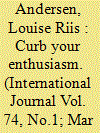

|
|
|
|
|
| Summary/Abstract |
The future looks post-Western. But will it also be post-liberal? To gauge how and by whom liberal internationalism may be sustained in the coming order, the article provides a critical and historically grounded analysis of the role of the United Nations in the fading US-led order and the ordering potential and role of middle powers. The article suggests that in the current interregnum of global governance the conventional distinction between traditional and emerging middle powers is increasingly unhelpful. What matters is not their past history, but their present proclivity for seeking multilateral, negotiated solutions. It is this pragmatic version of liberal internationalism that may have a future in a post-Western world, and open up a more pluralist, inclusive approach to global governance.
|
|
|
|
|
|
|
|
|
|
|
|
|
|
|
|
| 15 |
ID:
142006
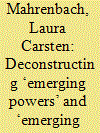

|
|
|
|
|
| Summary/Abstract |
Academic literature and the media offer a variety of monikers for emerging states like Brazil, India and China, most prominently, ‘emerging powers’ and ‘emerging markets’. This article argues the terms used to describe these states create assumptions about their behaviour in global governance (GG). In order to accurately assess the impact of emerging states on international institutions, it is necessary to more systematically examine their current participation in GG. Does the use of power and economic interests in GG negotiations distinguish emerging states from traditional powers, as the ‘emerging’ part of these terms suggests? And can the content of GG negotiations predict the dominance of each factor, as implied by the ‘power/market’ part? This article tackles these questions by comparing the behaviour of one emerging state (India) and one traditional power (the United States) in negotiations at the World Trade Organisation and the United Nations Security Council. The results demonstrate that, while there is clearly something distinctive about at least India’s participation in GG, focussing on power or economic interests alone is insufficient to explain that distinctiveness or its implications for relations between rising and traditional powers in GG.
|
|
|
|
|
|
|
|
|
|
|
|
|
|
|
|
| 16 |
ID:
163068
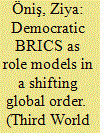

|
|
|
|
|
| Summary/Abstract |
India, Brazil and South Africa constitute an important subset of Brazil, Russia, India, China and South Africa (BRICS) and emerging powers at large in a shifting global order. The article examines the capacity of these democratic BRICS to serve as a role model to the rest of the developing world, at a time when liberal democracy seems to be experiencing serious challenges and dislocations in the Global North. The article considers the important achievements of democratic BRICS, in terms of their individual performances as well as through active cooperation strategies through organisations such as the India, Brazil and South Africa (IBSA) Dialogue Forum. Attention is drawn to the inherent structural dilemmas confronted by democratic BRICS to serve as genuine role models, given their domestic weaknesses as well as inherent constraints on their collective action strategies. Our central argument is that these countries, individually and collectively, are likely to have a crucial bearing on the future of liberal democracy on a global scale.
|
|
|
|
|
|
|
|
|
|
|
|
|
|
|
|
| 17 |
ID:
134112
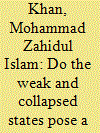

|
|
|
|
|
| Publication |
2014.
|
| Summary/Abstract |
Weak and collapsed states are portrayed as the primary global threat to security so frequently by the politicians, journalists and policy makers that it has almost become a reality. Yet, this seemingly universalised and undertheorised concept bears a different meaning to each actors and demands critical examination. From an international relations perspective, this paper examines the extent to which the weak and collapsed states challenge the realist account of maintaining world order. Conceptualising state weakness, this paper outlines the key realist assumptions to contrast those in weak states' context. Highlighting the realists underpinning that the structure of international system is resilient, the paper concludes that the concept of weak and collapsed states is a political construction and such states do not constitute a critical mass challenging the essential continuity of international order. International system is still dominated by powerful states and the opportunity for weak states to graduate upward under a resilient international system tends to outweigh the forces of weak and collapsed states, keeping the realist account of world order undaunted.
|
|
|
|
|
|
|
|
|
|
|
|
|
|
|
|
| 18 |
ID:
154716
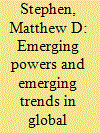

|
|
|
|
|
| Summary/Abstract |
In the 1990s, liberal optimism permeated the study and practice of international politics. International institutions were strengthened and the discourse and practice of global governance consolidated as a new approach to world affairs. Today, new powers are emerging in this institutionalized order. New powers have changed the power relations that underpinned global governance and are also economically, politically, and culturally different from established powers. Against this backdrop, this article investigates the impacts emerging powers are having on global governance. It presents six major trends and outlines their implications for the new global governance currently taking shape. Because new powers are emerging in an already institutionalized order, the emerging global governance order is gradually growing out of the existing one. Emerging powers are rendering parts of global governance dysfunctional, layering onto it, complicating it, but not overthrowing it.
|
|
|
|
|
|
|
|
|
|
|
|
|
|
|
|
| 19 |
ID:
130721
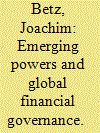

|
|
|
|
|
| Publication |
2014.
|
| Summary/Abstract |
The traditional mode of governance of national and global monetary and financial markets was obviously too weak and piecemeal to hinder the recurrent outbreak of regional and worldwide crises. The latest and gravest in this series triggered a massive institutional and operational overhaul, achieved both by the creation of new institutions and also by old and new ones being made stronger and more inclusive, foremost by introducing major emerging countries into their steering and oversight bodies. During this endeavour, national and institutional self-interests were initially subdued, but would come out forcefully later. As a consequence, the new edifices for multilateral market regulation and surveillance, as well as its financing, went only as far as the difficult compromise of an enlarged body of players would allow. Therefore, regional solutions or cooperation between like-minded countries were often seen as alternatives to a strong multilateral understanding, but are only able to complement the existing international monetary and financial system.
|
|
|
|
|
|
|
|
|
|
|
|
|
|
|
|
| 20 |
ID:
190747
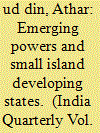

|
|
|
|
|
| Summary/Abstract |
Recent developments in climate change-related negotiations indicate that there are emerging conflicts of interest between Small Island Developing States (SIDS) and emerging powers like India and China. Emerging powers have to address their developmental concerns while pursuing aspirations related to leadership in global governance. To take a leadership role in global governance structures relating to climate change, emerging powers need to pursue their interests while accommodating the concerns of their potential followers, which include SIDS. Increased conflict of interests between emerging powers and other sets of vulnerable countries could lead to adverse implications for the North–South divide in international environmental relations, which in turn will impact their leadership aspirations. Using the example of leadership in international relations and the statements made by the SIDS at COP26, this article concludes that the existing situation presents a challenge as well as an opportunity for emerging powers like India to take a leadership role in a reformed new world order.
|
|
|
|
|
|
|
|
|
|
|
|
|
|
|
|
|
|
|
|
|